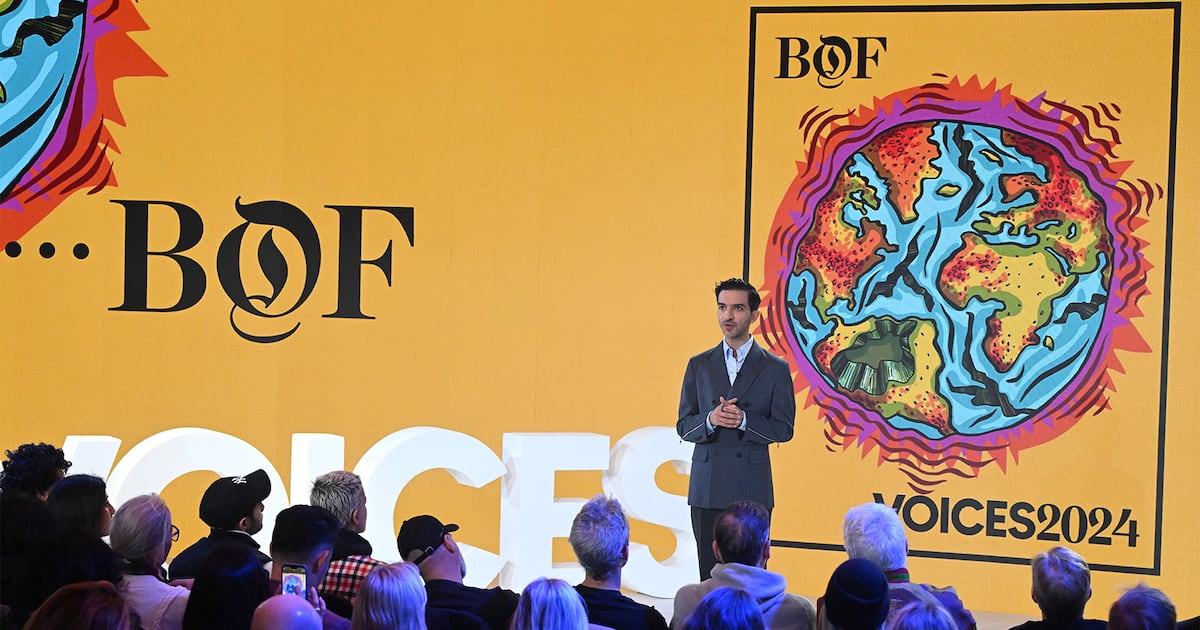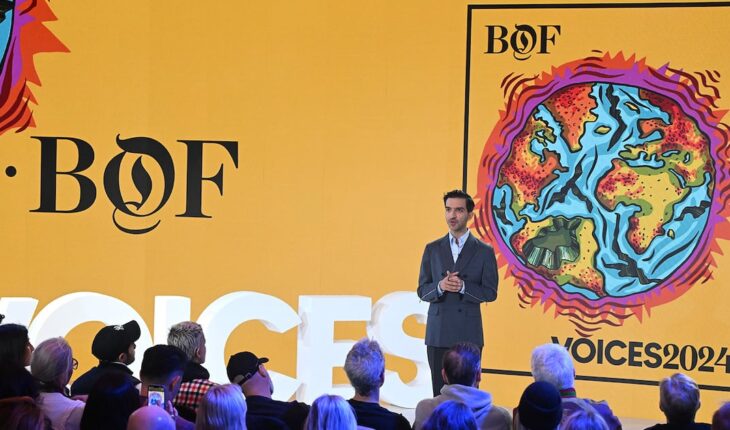
OXFORDSHIRE, United Kingdom — BoF VOICES 2024 kicked off Tuesday with a session described by media veteran and former Vanity Fair editor Tina Brown as a “combination of high style and brain sex.”
The ninth edition of The Business of Fashion’s annual gathering for big thinkers began with a wide lens on a world in turmoil, buffeted by disruptive new cultural, political, economic and technological forces.
“I can’t remember a more critical or more urgent moment for the fashion industry,” BoF’s founder and editor-in-chief Imran Amed said in his opening comments. “Right now, it feels like we are on the verge of some kind of cataclysmic upheaval, for which we are inadequately prepared.”
Navigating a New Era
The sense that the world is careening towards a tipping point is not just a function of the particular moment after a historic year of elections that has seen regime change around the world. The world really is on the cusp of a “new era” shaped by shifting demographic, technological and geopolitical forces, the chairman of McKinsey’s Global Institute Sven Smit said.
It’s a process that feels destabilising and alarming because the changes call into question many long-standing and accepted norms about the way the world works, who holds power, how to peacefully navigate systemic supply shocks and existential climate threats.
A central character in this new era’s drama is America’s new president elect, Donald Trump. Since he first entered the White House in 2016, Trump has served as an unpredictable agent of political chaos. “Trump doesn’t care so much about alliances, about rules and norms that have underpinned the world since World War Two,” said award-winning editor-in-chief of Foreign Policy Ravi Agrawal. Heading into his second administration, Trump’s “transactional approach” will have particular significance for trade, US immigration policy, the climate and global conflicts. “At an international level, Trump is going to bring turmoil,” Agrawal said.
Despite the dark pall of uncertainty overshadowing the current climate, Smit ended his talk on an optimistic note. At a macro level the future is bright, he said. The bigger picture story, that isn’t told enough, is one of human ingenuity and its capacity to trump the challenges at hand and usher in a new era of abundance.
Ghanaian entrepreneur Fred Swaniker built on this theme in his analysis of Africa’s ‘youthquake.’ By 2100, almost half the world’s young people will come from the continent, radically reshaping global demographics. “The world needs to shift the way we think about Africa. We need to look at Africa as a source of an immense supply of talent, but also innovation and ingenuity,” Swaniker said. “This will be the African century. The only question is whether this will be a good century or a bad century.”
New Threats to Free Speech
How the next century actually turns out will be determined, at least in part, by whether an increasingly polarised and fractious world can find means of common understanding and communication.
The signs at present aren’t positive. Take the current conflict in the Middle East, the horrors of which have sparked both outrage and a tidal wave of suppression of free speech from college campuses to cultural institutions and media.
“We’re not having the conversations that we need to have,” said Jameel Jaffer, executive director of the Knight First Amendment Institute at Columbia University during a powerful conversation with former Israeli peace negotiator and the president of the US/Middle East Project, Daniel Levy. “If we don’t have these conversations we end up retreating into echo chambers and becoming more polarised,” Jaffer said.
The threat to free speech is even more alarming given the rise of authoritarianism and the decline of media around the world.
This is partly an own goal. Over the last two decades the newspaper and magazine industry has ceded ground to tech giants, too slow to understand the threat posed by social media platforms and the internet’s advertising juggernaut. It’s too late for magazines to recover, said Brown.
“I don’t think [they] have a future, which grieves me,” she said. “I think magazines are going to go into the dark graveyard of empire.”
It’s vital newspapers don’t suffer the same fate, though the risks they might are clear, Brown added, pointing to the decision by the Jeff Bezos-owned Washington Post to pull an endorsement of Kamala Harris shortly before the US election.
“The resistance is going to have to come from the media,” said Brown. “More serious than anything is the death of truth and what that can do to a society.”
Imagining New Models
Successfully navigating this uncertain new era will require embracing radically different ways of thinking and operating, climate activists Nemonte Nenquimo and Clover Hogan said.
Nenquimo is a member of the Waorani Nation, an indigenous people from the Ecuadorean Amazon whose first encounter with Western civilisation occurred just little over half a century ago. In 2019, she led a legal victory that prevented the Ecuadorean government from auctioning off Waorani land to oil interests and set a precedent for other indigenous nations in the Amazon to protect their lands.
“When missionaries first landed they enticed my people with things of the outside world and they tried to convince my people that our ways were inferior,” Nenquimo said, speaking through her husband, partner in activism and translator, Mitch Anderson. “We continue to fight for our way of life and to protect biodiversity. We are 2,000 Waorani people, but we protect over two million hectares of rainforest against innumerable threats.”
The threat to planetary systems and climate is an existential challenge for this new age, and yet sustainability is sliding down fashion CEO’s agendas, according to The State of Fashion 2025. Instead of addressing fashion’s climate impact, big brands’ efforts to date have been incremental at best and greenwashing at worst, added Hogan in a speech that highlighted the urgency of action — with just six years left to avoid irreversible and catastrophic climate change.
“Our focus cannot be on making tweaks that marginally reduce our products impact; it must be on reducing production and consumption,” Hogan said, addressing the elephant in the fashion closet. “If the bathtub is overflowing, the first instinct shouldn’t be to grab a mop, it should be to turn off the tap … as a civilisation we are at a tipping point; inaction is no longer an option.”
BoF VOICES 2024 continues on November 12 from 10:30am London, 5:30am New York. Join us to learn from Simon Porte Jacquemus, Lauren Santo Domingo, Lawrence Lenihan, Gilda Ambrosio, Giorgia Tordini and more. Watch live here.





